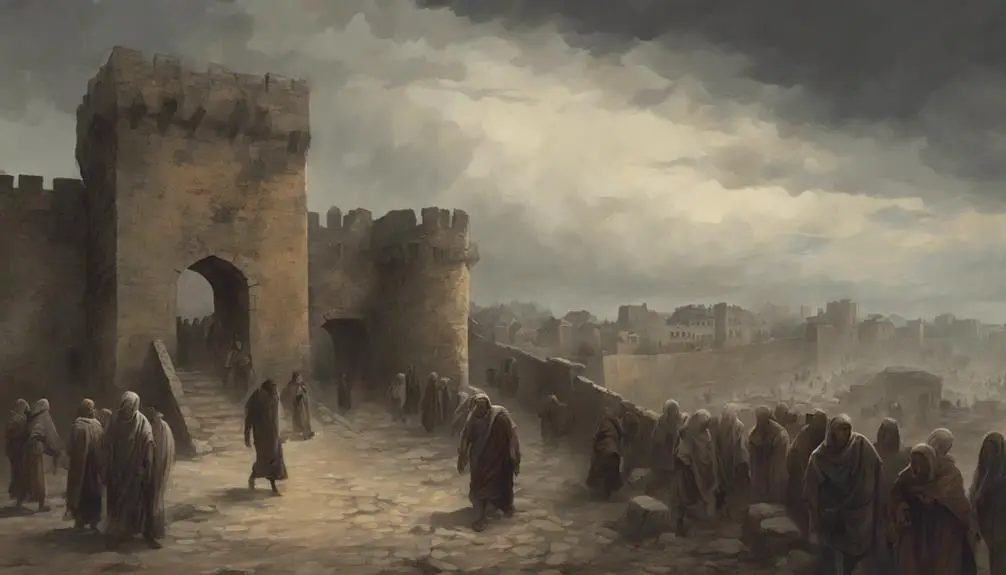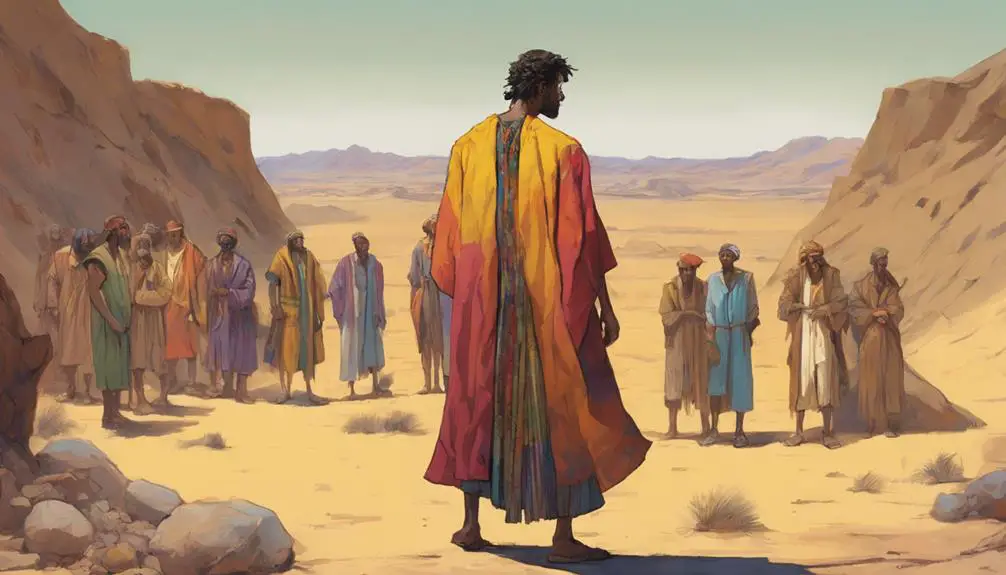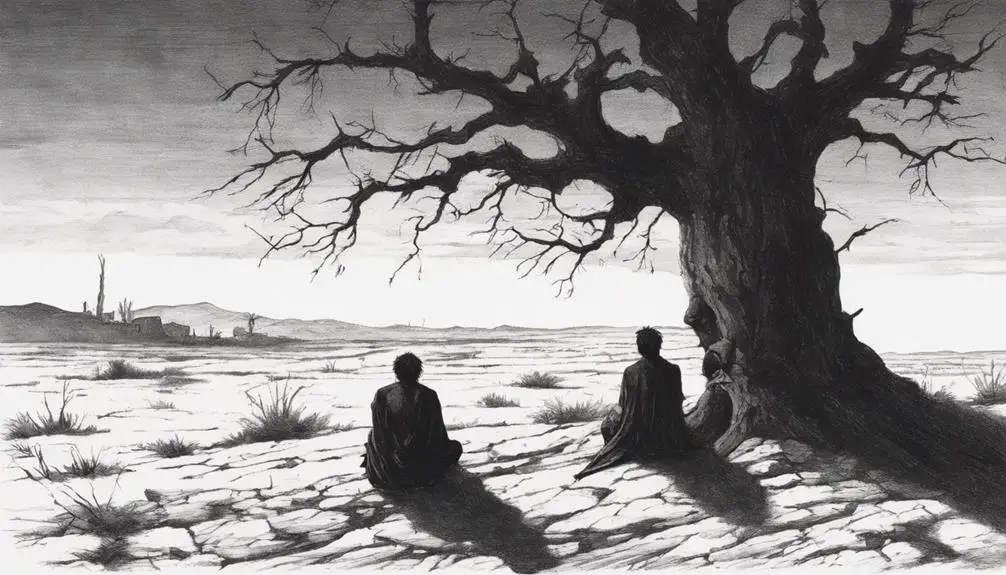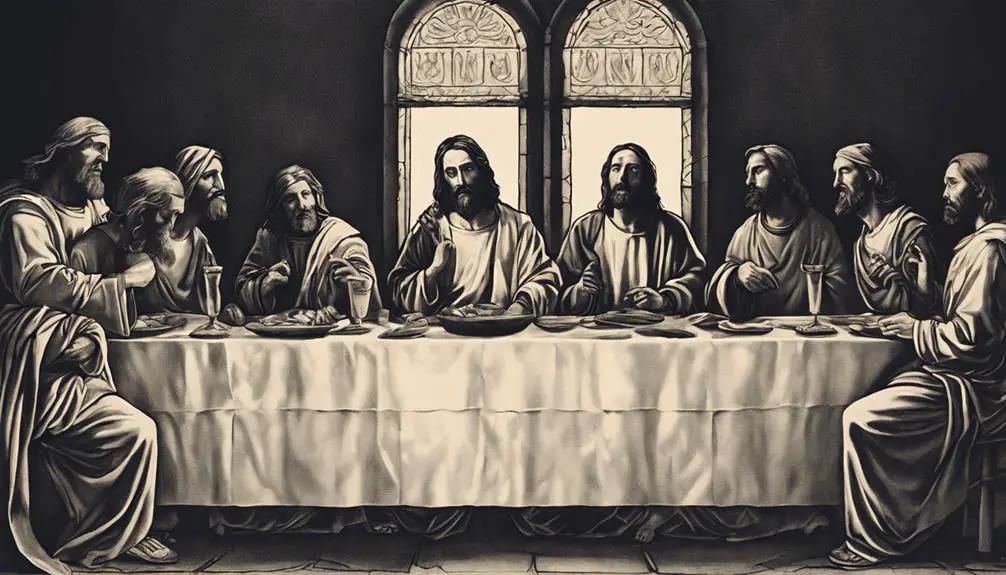Witness biblical tales of rejection and discover enduring lessons on resilience, faith, and overcoming adversity that still resonate today.

Spirit of Rejection in the Bible
You've probably never faced rejection quite like the biblical characters, whose experiences could make modern ghosting seem like a gentle letdown. From Hagar's desert exile to Joseph's pit of despair, the Bible is rife with tales of isolation and abandonment that resonate deeply with the human experience of being cast aside.
These stories aren't just ancient history; they hold profound lessons on resilience, faith, and the strength found in overcoming rejection. As you ponder these narratives, you're poised to uncover insights that challenge our understanding of rejection and how it shapes our spiritual journey.
What might these age-old lessons teach us today?
Key Takeaways
- Rejection in the Bible often leads to divine intervention and personal transformation.
- Biblical narratives highlight resilience and redemption in the face of betrayal and abandonment.
- The stories illustrate lessons on faith, loyalty, and the complexity of human-divine interactions.
- Rejection serves as both a test and a catalyst for growth, repentance, and forgiveness.
The Rejection of Hagar and Ishmael

The narrative of Hagar and Ishmael's rejection in the Bible exemplifies a complex interplay of familial, social, and divine dynamics. You're invited to delve into an analysis that underscores the pivotal role of divine intervention and maternal resilience in their story. This account, deeply embedded within the fabric of Abrahamic religions, illustrates not merely a tale of survival but a profound exploration of faith and perseverance in the face of abandonment.
Divine intervention is a critical element in their journey, marking a transition from despair to hope. It's fascinating to observe how, at their lowest point, the intervention by a higher power not only ensures their survival but also promises a future for Ishmael that's significant in its own right. This divine act reshapes the narrative, transforming a story of rejection into one of divine providence.
Equally compelling is the theme of maternal resilience. Hagar's determination, in the face of seemingly insurmountable challenges, highlights a mother's unwavering strength and faith. Her actions, driven by love and survival, are a testament to the enduring spirit of those faced with rejection.
Analyzing their story, you're encouraged to appreciate the intricate layers of meaning woven through their experience, offering insights into the enduring human spirit confronted with rejection.
The Outcasting of Lepers

Throughout biblical narratives, lepers often faced societal outcasting, a practice deeply rooted in both cultural and religious understandings of purity and impurity. This exclusion wasn't merely physical but symbolic, representing a deeper spiritual malaise believed to afflict the individual.
Aspect |
Impact on Lepers |
|---|---|
Leprosy Symbolism |
Signified moral and spiritual impurity |
Social Implications |
Led to isolation and societal rejection |
Religious Practices |
Required rituals for purification |
Community Response |
Fear and avoidance of lepers |
Healing Narratives |
Symbolized restoration and acceptance |
Leprosy served as a powerful symbol of sin, impurity, and divine punishment, deeply affecting the social standing of those afflicted. The condition didn't just affect the skin; it tore at the fabric of one's social identity, casting individuals into the shadows of society. This outcasting was not arbitrary but woven into the legal and religious texts of the time, which dictated strict separation from the community to prevent the spread of both physical and spiritual contamination. These narratives highlight the profound social implications of leprosy, demonstrating how health conditions can be imbued with moral judgments, leading to stigmatization and exclusion.
Joseph's Betrayal by His Brothers

Delving into Joseph's narrative, one observes his brothers' betrayal as a poignant illustration of family dynamics intertwined with divine providence. Joseph's journey, marked by dream interpretation, casts a stark light on the complexities of sibling relationships and the profound impact of rejection. His ability to interpret dreams not only sets the stage for his eventual rise to power but also acts as the catalyst for his brothers' envy and subsequent betrayal. This envy is rooted in the favoritism Joseph receives from their father, Jacob, further complicating the family dynamics at play.
Analyzing this story, it's evident that Joseph's rejection by his brothers isn't merely a tale of sibling rivalry but a reflection of deeper human emotions and societal norms. The act of selling Joseph into slavery reveals the extent to which jealousy and fear can corrupt, pushing individuals to betray their own blood. Yet, this narrative also underscores the theme of resilience and redemption, highlighting how divine providence can transform rejection and suffering into a path for fulfillment and leadership.
In essence, Joseph's story offers a multifaceted exploration of family dynamics, dream interpretation, and the interplay between human actions and divine will, providing valuable insights into the handling of rejection and adversity.
David's Isolation and Despair

In examining David's narrative, we encounter his profound isolation and despair as pivotal moments that reveal the complexities of leadership and divine testing. David's journey from shepherd boy to king is marked not only by his faith and courage but also by periods of deep loneliness and anguish.
Saul's jealousy, initially kindled by David's victory over Goliath's defiance, plays a critical role in David's descent into isolation. Saul, once a mentor and father figure, turns against David, driven by a fear that David's rising popularity among the people threatens his own rule. This betrayal forces David into hiding, severing him from his community and thrusting him into the wilderness of despair.
During this time, David's psalms become a window into his soul, revealing the depth of his struggle with rejection and loneliness. His cries to God reflect not only his personal anguish but also a profound understanding of human fragility and divine sovereignty. David's isolation, therefore, becomes a crucible for his character, refining his reliance on God and preparing him for the complexities of leadership that lay ahead.
Through this lens, David's story teaches us about the transformative power of enduring rejection with faith and resilience.
Job's Abandonment by Friends

Job's ordeal deepens as his friends, once pillars of support, turn their backs on him, exacerbating his sense of abandonment during his time of profound suffering. This narrative arc serves as a poignant exploration of human frailty and the complexities of faith under duress. It also provides a striking example of Job's resilience in the face of divine testing.
His friends, initially present to offer comfort, eventually become detractors, accusing Job of wrongdoing as the cause of his suffering. This shift underscores a critical aspect of the spirit of rejection:
- It often comes from unexpected sources, compounding the pain of the initial suffering.
- The transition from support to abandonment can test one's faith and resilience.
- Such experiences can serve as a form of divine testing, refining an individual's character and faith.
Through Job's response to his friends' abandonment, we observe a profound steadfastness in faith and an unwavering trust in the divine, despite immense personal loss and misunderstanding. Job's resilience amidst these trials not only exemplifies the strength of character but also highlights the complex interplay between human relationships and divine testing, offering deep insights into the nature of faith and endurance.
Jesus: Betrayal and Denial

Undoubtedly, the betrayal and denial Jesus faced from those closest to him mark pivotal moments in the biblical narrative, reflecting profound insights into human nature and divine purpose. The Gethsemane anguish, a poignant episode, underscores Jesus' profound vulnerability and foreknowledge of the impending betrayal by Judas, one of his own disciples. This act of betrayal, facilitated by a kiss, symbolizes the ultimate treachery, betraying not just a man but the embodiment of divine love and trust.
Simultaneously, Peter's denial, occurring thrice before the rooster's crow, reveals another layer of human frailty—fear and self-preservation leading to the abandonment of loyalty and truth. Peter's remorse, following his realization of the prophecy Jesus had foretold, serves as a critical reflection on repentance and forgiveness. These narratives collectively illustrate the complexity of human interactions with the divine, highlighting the ease with which faith can be shaken and loyalty forsaken under duress.
The betrayal and denial of Jesus thus stand as profound lessons on the human condition, offering insights into the spirit of rejection, the challenges of faithfulness, and the possibility of redemption and understanding, even in the face of profound betrayal.
Frequently Asked Questions
How Does the Concept of the 'Spirit of Rejection' Relate to Modern Psychological Understandings of Rejection and Its Impacts on Mental Health?
You've likely noticed how deeply rejection affects your mental health, echoing the ancient 'spirit of rejection.' Modern psychology links this to 'rejection sensitivity' and the pain of 'social exclusion,' showing how these experiences impact our well-being.
This connection between historical interpretations and current psychological theories highlights the enduring influence of rejection. By understanding this, you can better navigate the emotional landscapes shaped by rejection's profound effects on our psyche.
Are There Instances in the Bible Where Individuals Overcome the 'Spirit of Rejection' Through Divine Intervention or Personal Growth, Outside the Examples of Hagar, Ishmael, Lepers, Joseph, David, Job, and Jesus?
Embarking on a quest beyond the familiar, you'll find Moses' leadership and Esther's courage as beacons overcoming adversity. These figures didn't just navigate through personal rejection; they transcended it with divine aid and unyielding growth.
Moses, initially an outcast, rose to lead a nation, while Esther's bravery turned her from an orphan to a queen, influencing a king's heart. Their stories exemplify triumph over rejection, highlighting resilience and divine intervention.
How Can Christians Today Apply Biblical Teachings on the 'Spirit of Rejection' to Improve Their Relationships Within Families, Churches, and Communities?
To enhance relationships within families, churches, and communities, you can apply biblical teachings by emphasizing forgiveness practice and community building. By actively forgiving, you mirror the grace shown in scripture, fostering healing and unity.
Engaging in community-building activities strengthens bonds and promotes inclusivity, combating feelings of rejection. This approach not only nurtures personal growth but also solidifies the collective resilience against the challenges of rejection.
What Are the Theological Implications of the 'Spirit of Rejection' in the Context of God's Love and Redemption, Especially in Cases Not Mentioned in the Article Such as Hagar, Ishmael, Etc.?
You're diving deep, seeking theological implications of rejection in the light of God's love and redemption. It's a quest not for the faint-hearted!
When considering figures like Hagar and Ishmael, it's crucial to analyze how their stories intertwine with divine acceptance and the redemption journey.
This exploration isn't just academic; it's a profound inquiry into how divine narratives shape our understanding of acceptance, challenging us to rethink rejection within a broader, redemptive context.
In Biblical Narratives Not Covered in the Article, How Is the 'Spirit of Rejection' Shown to Affect the Course of History or the Fulfillment of God's Plans?
Considering the impact of negative emotions in biblical narratives, you'll find Cain's envy and Saul's jealousy pivotal. These emotions, driven by a sense of rejection, significantly altered history and God's plans.
Cain's envy led to the first murder, shifting humanity's trajectory. Saul's jealousy towards David undermined his kingship, facilitating David's rise. Both instances showcase how personal feelings, when unchecked, can influence larger divine narratives and historical outcomes.
Conclusion
In conclusion, the Bible intricately weaves tales of rejection like threads in a tapestry, each story revealing the profound impact of isolation and abandonment.
From Hagar's desert despair to Jesus' ultimate betrayal, these narratives underscore a universal truth: rejection is a crucible that shapes the human experience.
Yet, amidst the shadows of despair, a glimmer of hope persists, suggesting that even in our deepest rejections, there lies the potential for transformative growth and redemption.



Sign up